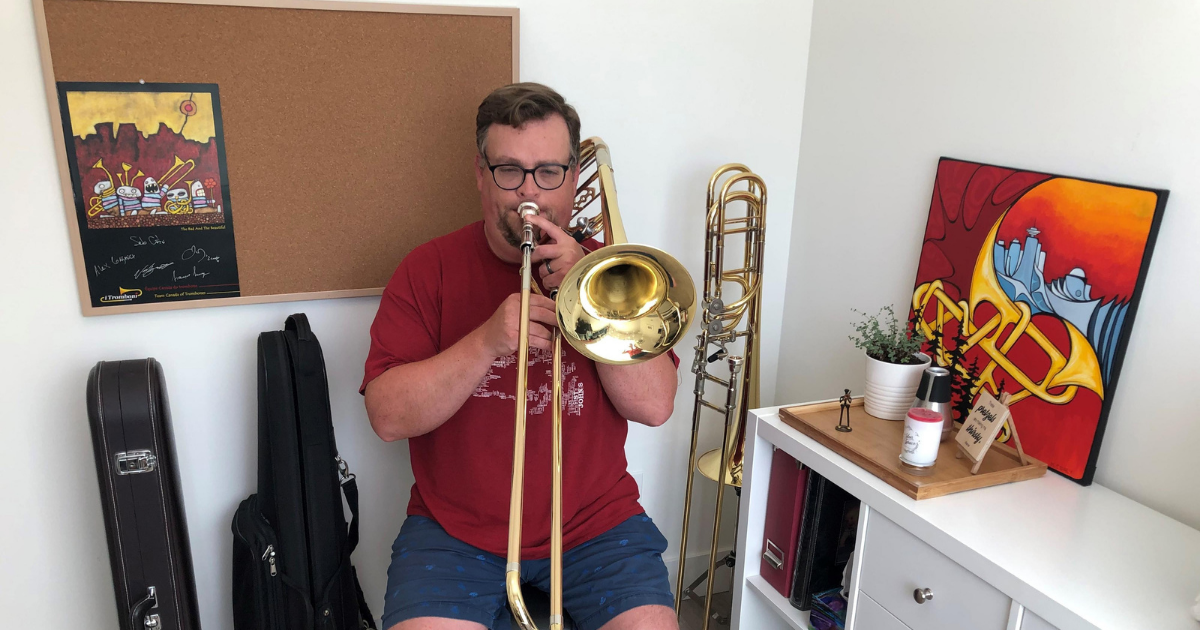Now that you’ve had a few extra minutes (hours, days, weeks) to practice over the last few months of “pandemic slowdown,” do you feel that your playing has gotten better? Worse? Stayed the same? I hope that it has gotten better, but it is sometimes difficult to measure progress when it is slow and spread over a long period of time. We have also been missing regular rehearsals and playing with others, which is often an obvious gauge of our progress, or lack thereof. So, the age-old questions: How do I practice? How do I get better? It is reasonable to expect that practicing will make you better, but what are you practicing? And why are you practicing?
Too often, we practice to check off a box in our daily routine or simply as a means to make it through a particularly difficult passage at the next band rehearsal. This, in and of itself, is not bad because at least you practiced! I do believe that having the horn on your face every day is essential, but it won’t make you a better player. It just won’t make you a worse player. Practicing that one, hard lick so your bandmaster doesn’t get mad at you in rehearsal will only make you better at that one piece, not better overall. We need to zoom out and look at the big picture. Here are some of the techniques you need to practice daily in order to be a better player:
I’m sure you have heard all of this before. But these are the building blocks to help you get better. There is no quick way to get better. Your practice must be methodical, consistent, and intentional. I’ll come back to that. We all know that warming up is important. It is the equivalent of stretching before a workout. Many times, the term warm-up is used as a generalization for the time you spend practicing everything from long tones to scales, or what we consider “your routine.” There are various schools of thought on whether having a routine is beneficial or not. I am firmly in the pro-routine camp. What does this mean? It means that I have a set of exercises that I do every day in the first block of my practicing. Some people do the exact set of exercises every day, in the same order. That may work for you. It doesn’t for me. I do a variation on the same set of exercises every day but not necessarily in the same order each time. I also allow myself to create new exercises that accomplish the same things. This is an opportunity for your creative side to come up with simple or challenging exercises that fit into the list of things you need to cover each day.
Now let’s discuss this “routine.” I want the routine to answer these questions: What do I practice? Why do I practice?
When I was a student, I often observed classmates learning a new routine and simply playing through it each day, with little to no regard for accomplishing a goal, apart from getting to the end of the routine. It became a rut. And it didn’t really benefit their development. I want your routine to be a remedy - the part of your practicing that makes you a better player. This is where the “intention” comes in. It is essential that you play each exercise in your routine with the intention of making yourself a better player. Try to make improvements to the exercise each day. How? Here’s what you need to do.
While playing each exercise, you need to think about and concentrate on at least three things. For example, while playing long tones, concentrate on:
• Breathing
• Articulation
• Pitch
While playing lip slurs, concentrate on:
• Sound quality
• Smoothness of connection
• Breathing
The next day, focus on three slightly different things for the same exercise. Do you get the idea?
I feel that this will make you much more focused on ensuring each exercise is as good as possible. If you’re not happy with any of the three things, do it again. It will be very hard to move on to the next exercise until you’ve accomplished this. To reinforce the idea, don’t move on until you’re happy with it. Be critical. You need to make yourself better. Use your “routine” time to really hone your craft. To back up what Rob Brown wrote in the June issue, don’t just practice your strengths. Make sure there are parts of your routine that you find challenging. Practice them every day. Make sure you focus on at least three things in each exercise.
Let’s circle back to the idea of practicing to make it through a difficult passage at your next band rehearsal. Why not break down the particularly difficult passage into the overall skill required to learn it. Is it a scale passage? Practice all your scales, with intention, as part of your routine. Is it a difficult lyrical passage? Build an exercise around it in your routine. Is it a difficult interval jump? High? Low? If you have exercises in your routine that cover these skills, you will be much more ready to adapt what you’ve been practicing every day and apply it to the immediate need within a piece.
I encourage you to keep practicing! Don’t just play. Whether you practice 30 minutes a day, or four hours a day, practice with the intention of getting better. Learn from each exercise. Everyone will benefit.
 This article was originally published in the September 2020 MAGAzine. Read the entire issue here:
This article was originally published in the September 2020 MAGAzine. Read the entire issue here:







Leave a Comment